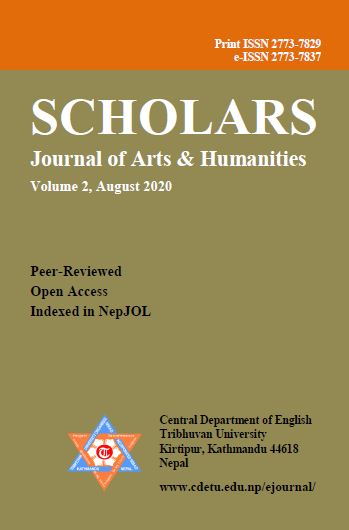Beyond Protest and Poetry: Political Vision in Devkota’s Selected Poems
DOI:
https://doi.org/10.3126/sjah.v2i0.35010Keywords:
Protest, agency, social structure, social vision, Nepali poetryAbstract
Great Poet Laxmi Prasad Devkota (1909-1959) transcends the quotidian sphere of social life to reach beyond the domain of the protest through his poetry in his perpetual quest for order. The core of social structures comprises of a body of rules derived from human imagination through which the underlying base in human society is regulated in the process of interaction of human agency and social mores. Since rational ways of society lead to justice and social welfare in general, the configuration of social structures depends on rational choices. However, certain lapses emerge as errors in the underlying principles of society, for the rational choices also give way to particular fissures in each age. Consequently, people aspire to obtain novel social structures through the invention and use of such structures in that errors in projection of public welfare result out of inability of the concerned people to project beyond the solid limitations of the time and space. However, after the passage of time, the value systems encounter with various challenges, whereby letting innovative perceptions emerge within the existing order of social imagination. As guides of society, the most sensitive minds including poets, philosophers, and visionaries spot blank spots in form of errors, lapses, and loopholes in unified, coherent vision of inner core of society. This paper argues that Devkota exploits the systemic errors in the underlying core of social system as the creative resource for his poetry. This paper new historically reads Devkota’s “The Lunatic” and “The Swallow and Devkota” to explore social and historical forces in the formation of particular mindset. The paper centers on the poet’s political vision for a just society.
Downloads
Downloads
Published
How to Cite
Issue
Section
License
© Central Department of English, Tribhuvan University and Authors




